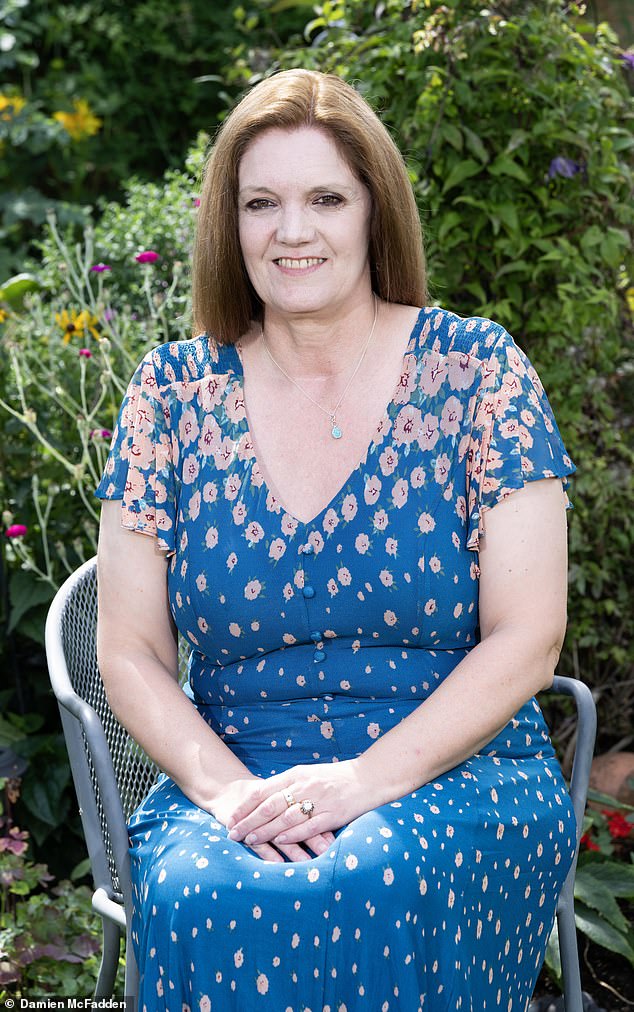Feeling exhausted every day became the norm for Brigitte Siefken, so much so that she’d have to go back to bed after breakfast or nap in the afternoon just to function.
‘It wasn’t just the tiredness and fatigue,’ recalls Brigitte, 55, a finance assistant, who is single and lives in Nottingham.
‘I also had pins and needles in my hands that came and went, and aching joint pains in my hips and ankles.
‘At night I couldn’t sleep as I had restless legs with cramping pains and the constant urge to move them. I used to teach modern languages and had a good brain that was very sharp, but I was struggling now to make decisions and remember things.’
Brigitte also noticed that her complexion was pale and strands of hair fell out more than usual when she brushed it – and she felt breathless and dizzy when she walked up the stairs.
A blood test by her GP revealed she had iron deficiency anaemia, (IDA) – meaning her iron stores were far too low – a common complaint among women especially, but the surprise in Brigitte’s case was why.
The body needs iron to make haemoglobin, the red pigment in blood that carries oxygen around the body and that is also uses to convert nutrients into energy.
Too little iron leads to low haemoglobin – and not enough oxygen being carried around the body, leading to a host of symptoms from tiredness and breathlessness to hair loss (due to insufficient oxygen reaching the hair follicles), brain fog, depression, heart palpitations, restless legs and even ‘pica’ (compulsive cravings for substances that have no nutritional value such as ice cubes or coal).

A blood test by Brigitte’s GP revealed she had iron deficiency anaemia, (IDA) – meaning her iron stores were far too low
Iron deficiency anaemia affects 16 per cent of women in the UK and three per cent of men – four million people, says Toby Richards, a professor of surgery at the University of East London, and director of the private Iron Clinic in London.
‘It’s the most common mineral or vitamin deficiency,’ says Professor Richards.
‘Many people are unaware of what is causing them to feel so tired. Sometimes they just put it down to the stresses of work and family life and accept it as one of those things.’
While a diet low in iron-rich foods can contribute, the most common cause of iron deficiency in women is usually period blood loss and pregnancy, explains Professor Richards – but that wasn’t the case for Brigitte.
‘I’d never had heavy periods,’ she says, ‘but I did have a long history of gut complaints – namely chronic acid reflux, which started 15 years before.’
The reflux had made Brigitte constantly nauseous and meant she often needed to sleep upright at night to stop acid leaking into her oesophagus – and her doctor had prescribed a type of drug called a proton pump inhibitor (PPIs) which stop production of acid in the stomach.
PPIs such as omeprazole, lansoprazole and esomeprazole (which Brigitte was taking), are some of the most commonly prescribed drugs in the UK, with an estimated 8million on them but studies have shown that long term use – over several years – may cause iron deficiency, as stomach acid helps make iron soluble and more easily absorbable.
‘That’s a lot of people who could become iron deficient as a result and are not aware of the link with anaemia,’ says Professor Richards.

Iron deficiency anaemia affects 16 per cent of women in the UK and three per cent of men – four million people, says Toby Richards, a professor of surgery at the University of East London, and director of the private Iron Clinic in London
A study published in the journal Blood in 2019 concluded that iron deficiency anaemia due to PPI use was ‘very likely much more common than recognised’ and should be considered in patients with unexplained iron deficiency anaemia without other risk factors.
Iron deficiency anaemia can be diagnosed with a blood test from the GP ‘but not everyone will get a blood test when they say they are fatigued, as GPs see a lot of tired people’, says Professor Richard.
‘If they do, it’s usually a full blood count [which measures haemoglobin], but what you really need is a specific test to measure ferritin levels [the protein that stores iron] as this is a key marker for iron levels.
‘Low levels of ferritin are like the petrol warning light coming on when your tank is nearly empty, so you can experience symptoms of iron deficiency.’
Professor Richards says those requiring high doses or long term PPI use, lasting years rather than weeks or months ‘should have a regular ferritin test every one to two years’.
However in practice this seems unlikely to happen – confirmed by research from Oxford University, published in the British Journal of General Practice last year, based on the health records of 14 million people: this concluded that iron deficiency anaemia testing and follow up in the UK was ‘suboptimal’.
The risk is that untreated, a lack of iron can lead to impaired immunity, an abnormally fast heartbeat and heart failure as the heart has to beat faster to try and circulate enough oxygen around the body. And detecting it is vital, as in men especially IDA can be a red flag of a serious underlying problem.
‘In men of any age, I’d always be worried if they have anaemia as it usually means they are losing blood from the gastric tract possibly due to inflammation, an ulcer or even cancer,’ says Professor Peter Whorwell, a consultant gastroenterologist at Manchester NHS Foundation Trust.
As many as 8.3 per cent of patients with unexplained IDA had cancers of the gastro intestinal tract, according to a 2022 study published in Frontiers in Gastroenterology.
One of the most common gastric causes of anaemia is coeliac disease (an autoimmune condition where the body makes antibodies to gluten), according to Professor Whorwell. The antibodies damage the finger-like villi lining the gut, reducing the absorption of minerals, including iron.
Like Brigitte, Derek Roberts, 38, was poleaxed with tiredness and fatigue and diagnosed with iron deficiency anaemia, but it took three years for doctors to discover this was due to undiagnosed coeliac disease.
‘I’d had a bereavement, our baby daughter had died in 2013 at just five weeks old, so I put my exhaustion down to grief,’ says Derek, a social media manager who lives in Airdrie, near Glasgow in Scotland, with his wife Jen, 40, an early years practitioner, and their two children aged 11 and six.
‘I was constantly tired, my legs felt so heavy, I’d wake up exhausted and struggle to walk up the stairs as I was so breathless.
‘I was working as a retail manager at the time and had brain fog so bad that I struggled to make any decisions at work so colleagues would ask if I was all right.’
After a few months Derek went to see his doctor and a blood test showed he was anaemic, and he was prescribed iron tablets – but they did him little good.
‘My GP was puzzled why I wasn’t getting any better and stopped the iron tablets and prescribed folic acid supplements in case I had a deficiency, but they made no difference either.’
This went on for three years. It wasn’t until Derek also developed gut symptoms, including diarrhoea and bloating, that a locum GP ordered a blood test for coeliac disease. The test was positive and confirmed by a biopsy a few months later. Derek switched to a gluten-free diet and his iron deficiency symptoms gradually disappeared and he says his ‘brain started working again’.
‘I’d never heard of coeliac disease, so it was a total surprise to find out this was causing my fatigue and making me anaemic,’ says Derek, whose father and sister have also subsequently been diagnosed with it.
‘I was unusual in that I had the fatigue symptoms before the gut symptoms, but a simple blood test could have saved me three years of living with anaemia.’
Professor Richards says some patients who suspect their symptoms are due to iron deficiency often try to self-medicate by buying iron supplements over the counter, but these are typically 15mg doses when the optimum dose needed is 300mg.
‘These products are okay for maintaining iron levels but not for treating iron deficiency,’ he says.
After Brigitte’s original diagnosis in 2018 she was given iron supplements which were of little use.
‘I had no energy. I felt like my tank was emptying and only topping up my sleep would help get me through the day,’ says Brigitte.
She was then given an intravenous iron infusion which slowly improved her energy levels before they dropped again a couple of months later.
Brigitte has had four IV iron infusions on the NHS over the past five years, but this year she paid £790 to have it done privately.
‘I was told by the NHS that, although my ferritin levels were low, until I actually became anaemic I couldn’t have an IV iron infusion – effectively, I had to get worse before I could be treated even though I had symptoms,’ says Brigitte.
‘My hope is that my story may cause medics to reflect on the long-term impact of PPIs and major gastric surgeries on patients, so that they are perhaps able help us better manage our challenges,’ she says.
‘With the right support, there is no need to live as iron deficient as some of us do.’
